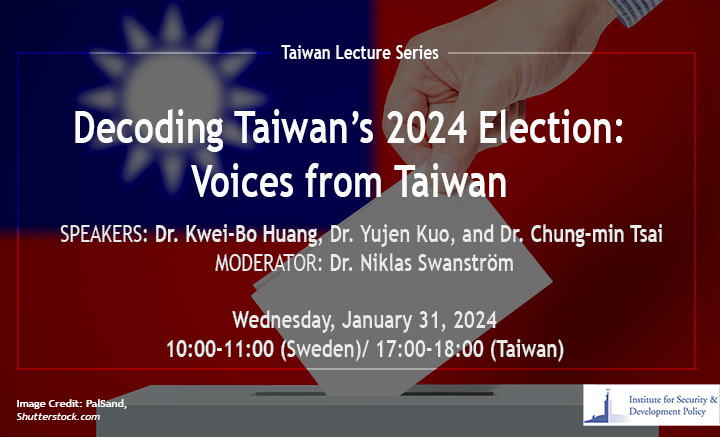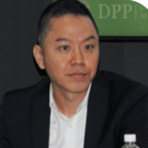Decoding Taiwan’s 2024 Election: Voices from Taiwan

Did you miss this webinar? The full recording is available on ISDP’s YouTube channel.
On January 13, after a suspenseful campaign, the people of Taiwan elected Lai Ching-te of the Democratic Progressive Party (DPP) to be their next president. He will officially take office on May 20th, 2024. Although the DPP made Taiwanese democratic history by securing a third consecutive presidential term, it simultaneously lost the parliamentary majority it had held since 2016. The DPP secured 51 seats, in Taiwan’s Legislative Yuan, down from 61. Both oppositional parties gained significant seats. With the Kuomintang (KMT) winning 52 seats, it is set to become the biggest party in the Legislative Yuan on February 1st, 2024. On the other hand, the Taiwan People’s Party (TPP) won 8 seats, positioning itself as the ‘critical minority’ in the legislature. With no single party securing the legislative majority of 57 seats, questions arise about what dynamics can be expected to follow.
Join us as Taiwanese scholars decode the outcomes of the 2024 Taiwan Presidential and Legislative Election, including the future of Cross-Strait relations, foreign policy implications, and how the DPP government will navigate its challenges in a Legislative Yuan without a majority.
Speakers:
 Dr. Kwei-Bo Huang is currently a Professor of Diplomacy, National ChengChi University (NCCU), Taiwan, R. O. China. Huang served as Vice Dean at NCCU College of International Affairs. He was also an adjunct researcher at ROC National Defense University’s National Strategic Studies Institute, a Fulbrighter at School of Advanced International Studies (SAIS), Johns Hopkins University in 2008, and a visiting fellow at Brookings Institution in 2012. In Huang’s public service leave, he was Chairperson of the Research & Planning Committee at ROC Ministry of Foreign Affairs from February 2009 to January 2011. He also served as Deputy Secretary-General of the Kuomintang (KMT) between April 2021 and September 2022, overseeing the Party’s mainland and international departments. Huang specializes in American foreign policy toward East Asia, ASEAN security, conflict management, and public diplomacy. He earned his master’s degree in Political Science from the George Washington University and his doctorate in Government and Politics from University of Maryland, College Park.
Dr. Kwei-Bo Huang is currently a Professor of Diplomacy, National ChengChi University (NCCU), Taiwan, R. O. China. Huang served as Vice Dean at NCCU College of International Affairs. He was also an adjunct researcher at ROC National Defense University’s National Strategic Studies Institute, a Fulbrighter at School of Advanced International Studies (SAIS), Johns Hopkins University in 2008, and a visiting fellow at Brookings Institution in 2012. In Huang’s public service leave, he was Chairperson of the Research & Planning Committee at ROC Ministry of Foreign Affairs from February 2009 to January 2011. He also served as Deputy Secretary-General of the Kuomintang (KMT) between April 2021 and September 2022, overseeing the Party’s mainland and international departments. Huang specializes in American foreign policy toward East Asia, ASEAN security, conflict management, and public diplomacy. He earned his master’s degree in Political Science from the George Washington University and his doctorate in Government and Politics from University of Maryland, College Park.
 Dr. Yujen Kuo is the Director and Professor at the Institute of China and Asia-Pacific Studies of National Sun Yat-sen University, Taiwan. He is also Vice President at the Institute for National Policy Research, INPR, and also the chairperson of the Global Risk Assessment Team, GRAT at INPR. He has served as an advisor at the Mainland Affairs Council since 2016. He is also an advisor to the Chinese National Association of Industry and Commerce, CNAIC Taiwan. He is also the President of the Taiwan Society of Japan Studies, TSJS since 2019. Dr. Kuo’s main research interests include Japan’s defense industry and policy, the U.S.-Japan alliance, as well as security issues at the Indo-Pacific region. Dr. Kuo was formally invited to give a talk to high-ranked government officials at the Japanese Ministry of Defense in 2014 to share his expertise and recommendations on the defense industry.
Dr. Yujen Kuo is the Director and Professor at the Institute of China and Asia-Pacific Studies of National Sun Yat-sen University, Taiwan. He is also Vice President at the Institute for National Policy Research, INPR, and also the chairperson of the Global Risk Assessment Team, GRAT at INPR. He has served as an advisor at the Mainland Affairs Council since 2016. He is also an advisor to the Chinese National Association of Industry and Commerce, CNAIC Taiwan. He is also the President of the Taiwan Society of Japan Studies, TSJS since 2019. Dr. Kuo’s main research interests include Japan’s defense industry and policy, the U.S.-Japan alliance, as well as security issues at the Indo-Pacific region. Dr. Kuo was formally invited to give a talk to high-ranked government officials at the Japanese Ministry of Defense in 2014 to share his expertise and recommendations on the defense industry.
 Dr. Chung-min Tsai is a Professor of the Department of Political Science at the National Chengchi University and Jointly Appointed Professor of the Taipei School of Economics and Political Science (TSE) at the National Tsing Hua University in Taiwan. He obtained his doctoral degree in political science from the University of California at Berkeley in 2010. His research includes comparative politics, political economy, and China studies. His articles have appeared in China Quarterly, Asian Survey, Problems of Post-Communism, Taiwanese Political Science Review, and other journals and edited volumes. His current research focuses on state regulation in China’s financial sector.
Dr. Chung-min Tsai is a Professor of the Department of Political Science at the National Chengchi University and Jointly Appointed Professor of the Taipei School of Economics and Political Science (TSE) at the National Tsing Hua University in Taiwan. He obtained his doctoral degree in political science from the University of California at Berkeley in 2010. His research includes comparative politics, political economy, and China studies. His articles have appeared in China Quarterly, Asian Survey, Problems of Post-Communism, Taiwanese Political Science Review, and other journals and edited volumes. His current research focuses on state regulation in China’s financial sector.
Moderator: Dr. Niklas Swanström, Director of the Institute for Security & Development Policy